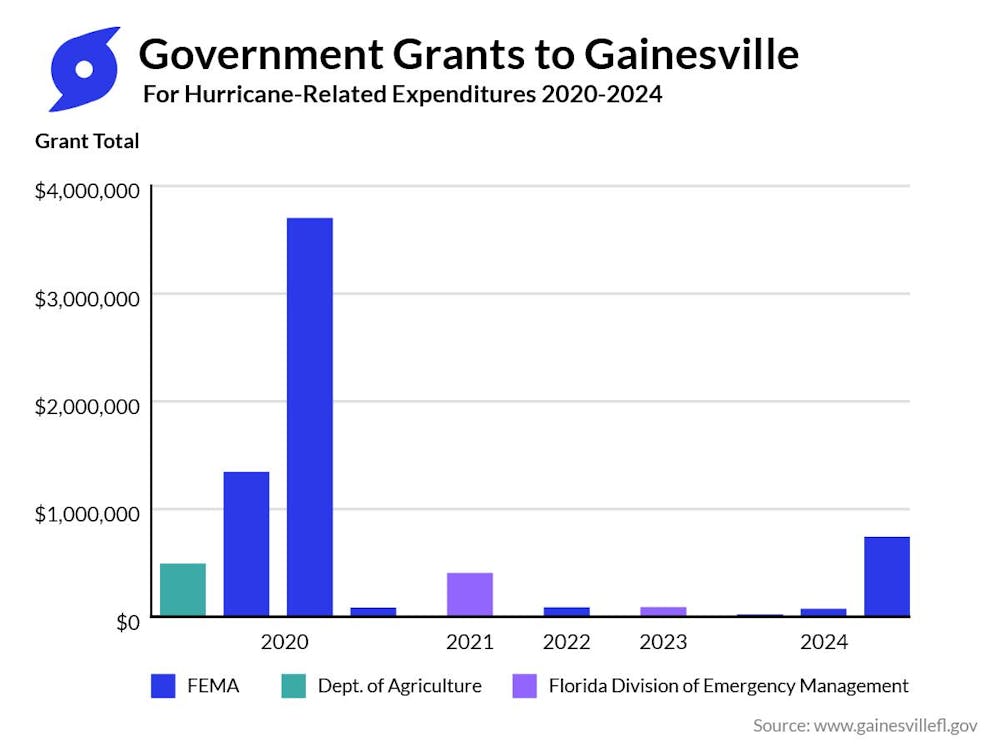Read more from The Alligator's "Ripple Effects" special section here.
A year after being hit with two hurricanes back-to-back, Gainesville and Alachua County have not received reimbursements from the Federal Emergency Management Agency. After recent federal changes, the future of the funds is unclear.
The Trump administration canceled billions of dollars in FEMA disaster payments Sept. 15, according to a government report, and it has expressed interest in disbanding the agency altogether. In January, President Trump signed an executive order creating a council to assess FEMA to propose structural reforms.
“We want to wean off of FEMA, and we want to bring it down to the state level,” Trump said, per CNN. “A governor should be able to handle it, and frankly, if they can’t handle it, the aftermath, then maybe they shouldn’t be governor.”
Hurricanes Helene and Milton hit Florida’s Gulf Coast in 2024 as Category 4 and 3 hurricanes, respectively. The two hurricanes caused 289 deaths across multiple states, according to reports by the National Oceanic and Atmospheric Administration.
Gainesville and Alachua County suffered varied infrastructure damage.
Almost 40% of Gainesville lost power during Hurricane Helene, according to previous Alligator reporting, and fallen trees damaged power lines and blocked over 50 roadways across the city.
Alachua County lost almost 170 traffic lights during the storm, but no major injuries were reported. The county was set to receive $6.5 million in FEMA reimbursement for the damages, according to Tommy Crosby, assistant county manager for budget and fiscal services.
Prepared for the worst
The Alachua emergency reserve was originally established on general fund dollars, Crosby said. That means the money came from local taxpayers, not federal or state disaster programs. Now, the county is waiting on its FEMA reimbursement to replenish the reserve.
Financial documents indicate the county reported about $21 million in revenue but $22.3 million in expenses for its 2024-25 fiscal year emergency services fund.
Jennifer Grice, Alachua County’s emergency management director, said the county is adding to its monetary reserve in case it has to take over FEMA’s financial responsibility.
Direct effects of the federal changes have not necessarily hit yet, she said, as reforms will only be implemented after this hurricane season, but the county’s priorities will always be residents’ life, safety and protection.
“I would want the public to know that our mission doesn't change,” she said.
Alachua County receives the Emergency Management Performance Grant, a preparedness fund given by FEMA every year, Grice said. Regarding the grant’s future, Grice said she did not want to speculate on what the government will do, and it's unclear whether the grant will be renewed.
The county’s additional emergency funding comes from its general fund and the state’s Emergency Management Preparedness and Assistance program, or EMPA — a yearly grant distributed to Florida counties.
Grice’s current focus is community outreach. Alachua County has ramped up efforts to educate residents about emergency preparedness, ensuring they are better able to weather the next storm.
“It is more essential than ever that our residents get as prepared as they possibly can with the means that they have," she said.
That includes cooperating with the local Community Organizations Active in Disaster group, or COAD.
COAD members assist with tasks the government can’t do, including cleaning private properties. The emergency management office is helping ensure the group has enough members to meet Alachua’s needs, Grice said.
She added FEMA may also transfer disaster recovery center responsibilities to local governments. Disaster recovery centers assist residents with housing resources and FEMA applications after natural disasters.
Grice said the county is searching for local agencies, locations and equipment it may need to “pull this off” if it becomes the county’s responsibility.
An uncertain future
Interim Emergency Manager Alvin Jones said Gainesville has not received the Federal Emergency Management Agency reimbursement for last year’s hurricanes, though he added it’s not unusual for reimbursements to take some time to disperse, especially if the storm caused widespread impact.
North Carolina took the brunt of Helene’s storm, claiming nearly half of the hurricane’s victims. The Carolina Public Press reported last November damages from Helene would cost more than $53 billion. Milton’s damage was centered in Florida’s Gulf Coast in cities such as Sarasota, costing Sarasota County around $440 million.
“You have to imagine it’s not just our area that’s affected,” Jones said.
Emergency funds are typically used in accordance with a city’s needs, he said, and county-wide spending summaries are sent to the state, and then to FEMA, after disasters. Though Gainesville and Alachua emergency departments work separately, Jones said, FEMA reimbursements are on a county-by-county basis.
Jones declined to comment on how the federal FEMA changes may impact Gainesville’s emergency budget.
Gainesville Mayor Harvey Ward said the city does not have a set budget for natural disasters, but levels of financial preparedness are “baked into” the budgets of all the city’s departments.
The city holds a cash reserve with 25% of Gainesville’s general fund for emergency situations. In the past, Gainesville counted on the FEMA reimbursements to maintain its disaster funding, Ward said.
The city has always followed necessary FEMA protocols, Ward said, and after Milton and Helene, it hired consultants to follow clean-up teams and ensure all their work was fully refundable.
The recent federal changes mean FEMA now provides reimbursements based on immediate need. Immediate Needs Funding status is only enacted when disaster relief costs more than what’s available, and FEMA is needed to provide “lifesaving, life-sustaining” operations.
Since 2001, FEMA has only entered nationwide immediate-need status 10 times. Though the agency has not entered that status this year, it is prioritizing immediate need over other operations, such as recovery activities from previous emergencies.
Ward said the city can no longer expect FEMA’s assistance when it comes to natural disasters, and the national funding cuts will hurt a lot of cities. He added Gainesville will continue to follow its procedure of maintaining a 25% disaster relief fund regardless of FEMA’s future.
“Let's all keep our fingers crossed that the federal government gets right, and builds or rebuilds … a system that will be a backstop for cities and counties, and local governments of all sorts, when, not if, when natural disasters occur,” Ward said.
Contact Maria Arruda at marruda@alligator.org. Follow her on X at @mariazalfarruda.

Maria Arruda is a second-year journalism and political science student, currently working as the City Commission reporter for The Alligator. Previously, she reported on Student Government under The Alligator's University desk. She enjoys running, reading and going to movie theaters!






